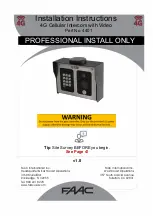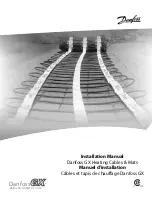
Additional Information
55
System limitations of
MDs
The recording system in your MD deck has the
limitations described below.
Note, however, that these limitations are due to
the inherent nature of the MD recording system
itself, not to mechanical causes.
“Disc Full!!” appears before the
MD has reached the maximum
recording time
When 255 tracks have been recorded on the MD,
“Disc Full!!” appears regardless of the total recorded
time. More than 255 tracks cannot be recorded on the
MD. To continue recording, erase unnecessary tracks
or use another recordable MD.
“Disc Full!!” appears before the
maximum number of tracks (255)
is reached
Fluctuations in emphasis within tracks are sometimes
interpreted as track intervals, increasing the track
count and causing “Disc Full!!” to appear.
The remaining recording time
does not increase even after
erasing numerous short tracks
Tracks shorter than 12 seconds are not counted, so
erasing them may not increase the recording time.
Some tracks cannot be
combined with others
Track combination may become impossible when
tracks are shorter than 8 seconds.
The total recorded time and the
remaining time on the MD do not
add up to the maximum
recording time
Recording is done in minimum units of 2 seconds
each, no matter how short the material. The recorded
contents may be shorter than the maximum recording
capacity. Disc space may also be reduced by
scratches.
The sound may drop-out while
searching the edited tracks
Tracks created through editing may exhibit sound
dropout during searching because high-speed
playback requires time to search for the position on
the disc when the tracks are not in order.
Track numbers cannot be
marked
When “LEVEL-SYNC” (page 30) lights up in the
display window during analogue recording, the track
numbers may not be marked at the beginning of the
track:
• if the input signal is below a certain fixed level for
less than two seconds between tracks.
• if the input signal is below a certain fixed level for
more than two seconds in the middle of the track.
Guide to the Serial Copy
Management System
Digital audio components, such as CDs, MDs, and
DATs let you copy music easily with high quality by
processing music as a digital signal.
To protect the copyrighted music programmes, this
system uses the Serial Copy Management System that
allows you to make only a single copy of a digitally
recorded source through digital-to-digital
connections.
You can make only a first generation copy
*
through a digital-to-digital connection.
For example:
1
You can make a copy of a commercially available
digital sound programme (for example, a CD or
MD), but you cannot make a second copy from the
first-generation copy.
2
You can make a copy of a digital signal from a
digitally recorded analogue sound programme (for
example, an analogue record or a music cassette
tape) or from a digital satellite broadcast
programme, but you cannot make a second copy.
* A first-generation copy means a digital recording of
a digital signal made on digital audio equipment.
For example, if you record from this system’s CD
player to the MD deck, you make a first-generation
copy.
Note
This copy management system doesn’t apply when
you make a recording through analogue-to-analogue
connections.










































